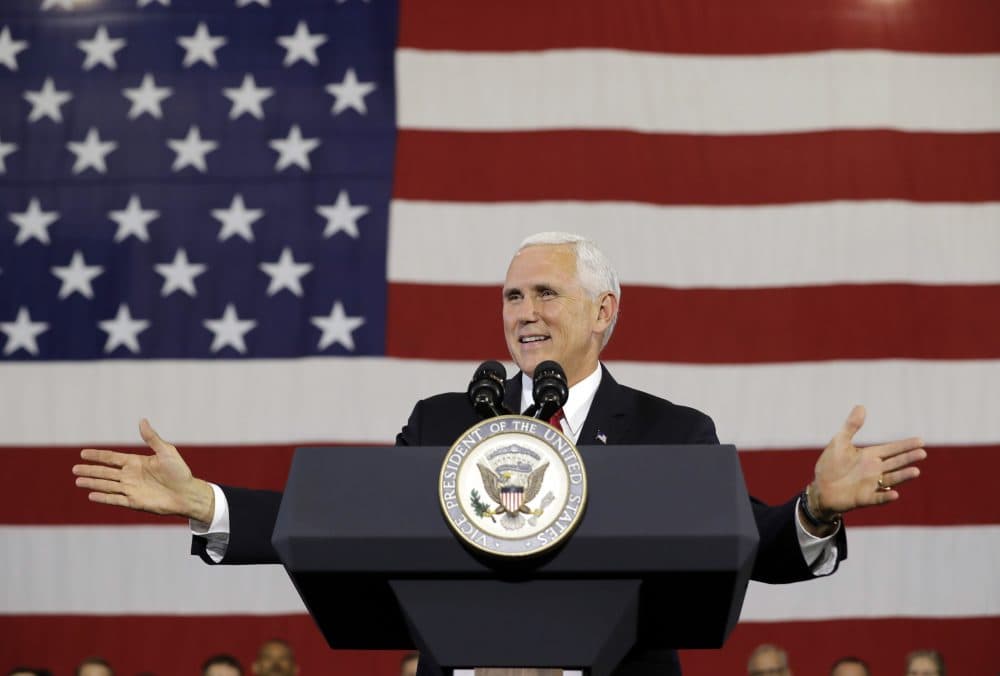Advertisement
From Thomas Jefferson To Mike Pence — The Power Of The Vice President
Resume
This week on Freak Out And Carry On, Ron Suskind and Heather Cox Richardson talk with Barbara Perry, Director of Presidential Studies at the University of Virginia's Miller Center. They discuss the new profile of Vice President Mike Pence in The New Yorker and look at the power — or lack thereof — of vice presidents, from Thomas Jefferson to Dick Cheney.
Excerpts
Ron Suskind: This week we want to focus on the man who most likely would take over for Donald Trump if he doesn't finish his term, which he might not for a variety of reasons. There's all sorts of demons besetting him at this point, from the Russia investigation to his sagging poll numbers. He's certainly not succeeding as president using the traditional yardstick. Many of his folks may say this is exactly what they wanted, maybe 30-35 percent of his electorate seem to be firmly behind him. So I guess the question that everyone is freaking out during the first nine months of the Trump Presidency is: is it better to stick with Trump or have a Pence presidency. Now outwardly, Pence clearly has handled his role as faithful foot soldier to Donald Trump with great deafness. But there have long been rumors that Vice President Pence has ambitions to be high the number two slot. Look who doesn't? Every politician dreams of it. A Pence presidency would certainly be socially and economically conservative without all the many distractions that come with Donald Trump.
Heather Cox Richardson: At this moment, the question is would we take a president Pence over a President Trump and if so why? And of course there's different reasons to think about whether or not that's a good idea. Some people think that people who are opposed to the Trump administration are better off staying with Trump because he's so outrageous that it's an easy target to hit in a way that Pence would not be. But I personally would take a president Pence over President Trump for this reason: my understanding of President Trump is that he is he is a narcissist, he can't back down, he can't accept blame and he can't deescalate. And to give the most powerful man in the world unlimited chances to escalate all of his feuds seems to me to be a kind of danger that we don't face with a president Pence who would not escalate to all ends. That being said President Pence, I think, would be deeply problematic for the country for two reasons. The first, is that he is much more old fashioned conservative Republican, very conservative, economically and socially. But also the real emphasis of Vice President Pence has always been on his evangelical conservatism and he is a person who believes that this is a Christian nation and that Christians must take back over the country. Of course that is ahistorical. This is not founded as a Christian nation and we don't even have to argue it that's just a fact. So basically putting Pence in is going to give you the Koch brothers with an evangelical slant and there aren't that many Americans who think that's a good idea.
Barbara Perry: Thomas Jefferson wrote to Benjamin Rush about the vice presidency, as he was taking over the office, "A more tranquil and unoffending station could not have been found for me." That was in typical Jeffersonian diplomatic language. So first of all, we start with this fascinating concept that the person who comes in second in the Electoral College, the also ran, the the runner up, is the person who is vice president. So before the 12th Amendment is added, in 1803, we have the person who comes in second gets to be vice president. So you end up with this situation for Thomas Jefferson in which you have, for the first and only time, an inadvertent situation in which you have a president and vice president of the two different parties. And it was a very heatedly opposition: the Federalist led by John Adams, the president, and Thomas Jefferson, as his vice president, the head of the what were then called Republicans (No relation to the current Republicans). Thomas Jefferson was going to not serve at the pleasure of the president. He would be a partisan.
Ron Suskind: You know it is hard to gauge how much power Mike Pence actually has serving a president, Donald Trump, who is clearly challenged by the dictates of the office. You know I covered, I think, the closest antecedent to this which is the George W. Bush-Dick Cheney relationship. Cheney was enormously skilled and experienced and ends up being, arguably, the most powerful vice president in American history. And that dance between he and Bush was fascinating to watch as it evolved over the years. At the beginning, Cheney is too much in charge. Bush's estimation of that is seen early on when he says to Cheney, "look you've got to step back" and Cheney, deft as ever, says "Yes. I see that as well, sir. And so what we'll do is I will pull back in some of these big group meetings and then after you and I will meet and I can talk to you about choices and consequences and what was discussed." And of course that's exactly the arrangement that then takes hold after the big meetings. There are private meetings between Bush and Cheney where Cheney sits Bush down and describes essentially the sets of choices and consequences discussed. It was a tension throughout their presidency. Cheney had vast experience. He had served three presidents at that point: Richard Nixon, Gerald Ford and George H.W. Bush. There was a moment early in the second term of the Bush presidency where they got into some battles where Bush saw that Cheney's direction and advice on weapons of mass destruction in Iraq turned out to not have been the most advantageous bit of counsel. Then, Dick Cheney's right hand man Scooter Libby was taken down in that battle over leaking classified information. Libby was convicted of a felony. And Cheney said "Mr. President you need to pardon him." And Bush said "He's not my guy, Vice, and he broke the law." And Cheney said basically we're leaving a man on the battlefield and that is morally wrong. And they were pretty much broken up this marriage from that point forward 2006, 2007. They talked less and less and often by the end very little so.
Barbara Perry: I really like Harry Truman. I have a soft spot in my heart for him as someone who has such a fascinating background and having to follow FDR. Imagine how difficult that was just before the war is ending? And now the people have to turn to Truman to lead us through the the end of the war? And again, sadly, he drops in approval ratings and leaves office in the mid-to-low 20s for approval ratings. But then in the 1970s, just before he passed, as we're getting closer to Watergate and Vietnam is hot, the singing group Chicago had that song with the line "America needs you Harry Truman, Harry why don't you come back home." And then with his death in the early 1970s he really sort of captures the American imagination again. He was the common man with no college degree and he had risen up through the ranks, including his service in World War One, to become what is considered a near-great president.
The views and opinions expressed in this podcast are solely those of the participants and do not in any way reflect the views of WBUR management or its employees.
